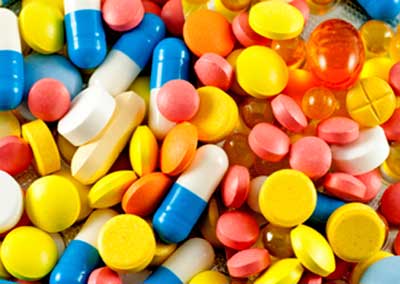|
by Martha Rosenberg
from
AlterNet Website
Photo Credit:
Shutterstock/Adam Michal Ziaja
Why has Big Pharma failed to produce new antibiotics for deadly infections like, ...even as they leap from hospital to community settings?
Because there is no money in it.
Nor are medicines for tropical diseases like malaria,
which kills a child every 30 seconds, a priority, notes Petersen.
They also lack ka-ching.
Between 2001 to 2007 the percentage of adults and children on one or more prescriptions for chronic conditions rose by more than 12 million, reports the Associated Press and 25 percent of US children now take a medication for a chronic condition.
Seven percent of kids take two or more daily
drugs. Who says advertising doesn't work?
...none is taken occasionally, or "as needed" and the treatment goal is never to get off the drug, like an antibiotic.
Why would Pharma deal
itself out of the game?
Needless to say, in both cases, people never know if the drugs are working or whether they would have had symptoms without them. This creates a loyal customer who is afraid to quit a prescription because it might be working.
And why should they quit anyway when a third party is
probably paying?
No wonder Michael Bandick, brand manager for Eli Lilly's popular antipsychotic Zyprexa, called it,
But giving kids daily drugs creates two problems.
First, parents will never know if their kids would have outgrown their conditions, and second, it's unlikely they'll ever get "clean." In fact, Pharma marketers worry about the revenue threat of kids going off their meds when they leave home and even run an ad campaigns in college newspapers to keep them on.
One ad shows the lead singer of Maroon 5, declaring,
The ad's tag line reads,
The scheme of treating estrogen "deficiency" for 30 or 40 years worked until 2002 when HRT was found to cause breast cancer, heart attacks, strokes, blood clots and dementia.
They were some of the conditions it was supposed to prevent. Oops.
But Pharma has not abandoned the billion-dollar franchise and news about estrogen benefits is creeping back into the news, predicated on the public's short memory. People don't lose hormones because they age; they age because they lose hormones, say Pharma hormone sellers.
Even men now
"suffer from" testosterone deficiencies or Low T.
Instead of
taking the occasional Xanax, people agreed to alter their entire
body chemistry with a drug they took for months, years or decades.
Depression is linked to heart disease, obesity, diabetes, Alzheimer’s and cancer says a second WebMD article.
Stay on your meds.
But over 110 million prescriptions were written for proton pump inhibitors (PPIs) like Nexium and Prevacid in 2009, making it the third most prescribed class of drugs. Long-term use of PPIs increases the risk of hip, wrist and spine fractures, the FDA warns and the drugs can cause potentially lethal C. difficile-caused diarrhea and community-acquired pneumonia says national health advocacy group, Public Citizen.
But Pharma has a different message. GERD can lead to esophageal inflammation, scar tissue and cancer, if untreated, it tells patients and symptoms won't go away on their own.
No wonder doctors call PPIs "Purple Crack."
But medical professionals say it is not safe to stay on statins indefinitely.
Patients are at risk of liver
dysfunction, acute kidney failure, cataracts and muscle damage known
as
myopathy, reports
British Medical Journal. And statins can also
cause memory loss and increase the risk of developing of Type 2
diabetes and muscle damage,
FDA warns.
Statins are now prescribed for kids, for the same reason.
It has also marketed daily asthma "control" medicines like Advair and Symbicort so aggressively (prescription drugs added onto patients' regular asthma medicine - ka-ching) that nearly two-thirds of the nation's millions of asthma sufferers take them.
Despite the expense of adding an additional drug to rescue inhalers or inhaled corticosteroids when asthma is a lifelong disease, there are no clinical benefits to the upsell, says the research institute of Medco, the nation's largest pharmacy benefit manager. Neither trips to the ER or hospitalizations are reduced with control drugs.
And there's another mark against the daily drugs that don't work:
|

